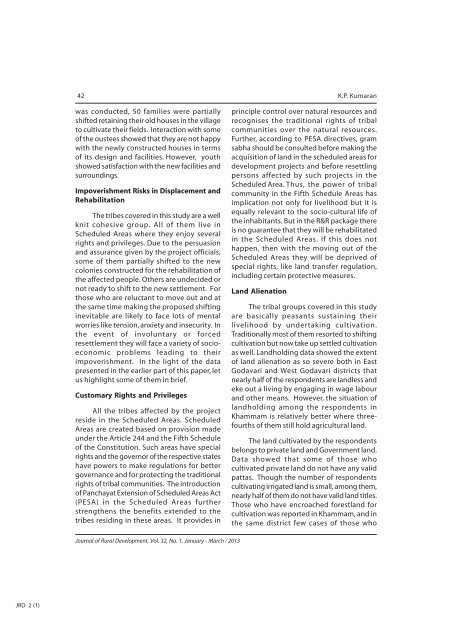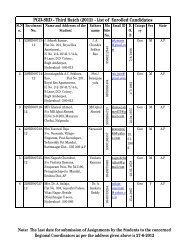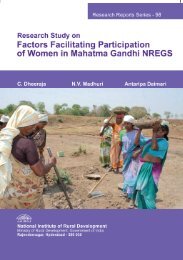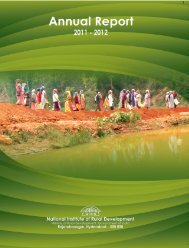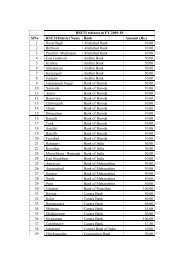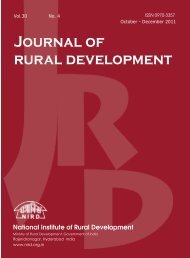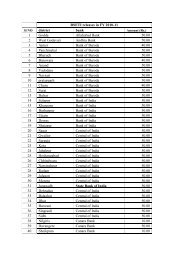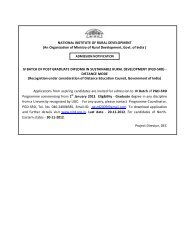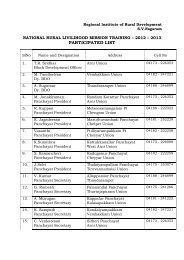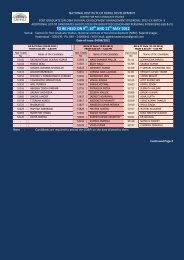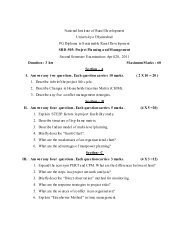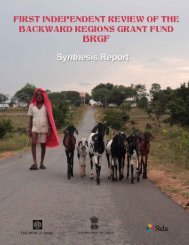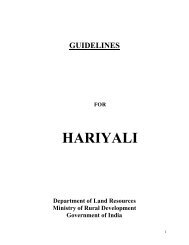Socio-Economic Impoverishment Risks in Displacement <strong>of</strong> Tribes Under Polavaram ... 41respondents' shelter was affected and thecumulative loss incurred by them during theperiod amounted to <strong>of</strong> ` 11,60,000, whichcomes to ` 6,409 per head.Those who were affected by crop lossconstituted 65 per cent <strong>of</strong> the respondents inthe study areas and the cumulative lossincurred amounted to ` 22,02,000 indicatingan average loss <strong>of</strong> ` 13,190 per head. Theextent <strong>of</strong> loss <strong>of</strong> crop was reported more inKhammam where 78 per cent got affected byflood, while the same distribution was 37 percent in East Godavari and 52 per cent in WestGodavari. The total loss incurred in EastGodavari and West Godavari stood, respectivelyat ` 6,08,700 and ` 8,55,000 with an average<strong>of</strong> ` 18,451 and ` 16,442, while in Khammam,the same amounted to ` 7,39,100 and theaverage loss was ` 9,476 per head.Information in respect <strong>of</strong> value <strong>of</strong> cattle lost inthe flood showed that at the aggregate sampleonly 24 per cent <strong>of</strong> them reported to the tune<strong>of</strong> ` 1,74,000 indicating an average value <strong>of</strong>` 7,250 per head. More loss was reported inEast Godavari due to the death <strong>of</strong> cattle. Atthe sametime less number <strong>of</strong> respondentsreported loss <strong>of</strong> trees and plantations in thestudy area. The above information showedthat the respondents were threatened bynatural calamities, like flood and cycloneleading to huge loss <strong>of</strong> their physical assets.Measures Taken for Rehabilitation <strong>of</strong> ProjectAffected PeopleThough acquisition <strong>of</strong> land is a slowprocess, efforts to acquire land from theproject-affected families (PAF) are going on.In East Godavari an area <strong>of</strong> 645 acres is to beacquired out <strong>of</strong> which all the area have beenacquired from the tribals. While in WestGodavari the area <strong>of</strong> land to be acquired fromthe tribals amounted to 667.85 acres. Out <strong>of</strong>this, an area <strong>of</strong> 253.16 acres have already beenacquired, whereas in the case <strong>of</strong> Khammamland acquisition is yet to take <strong>of</strong>f due to theresistance exerted by the project-affectedfamilies. As a result <strong>of</strong> this, although an area <strong>of</strong>5370 acres have been earmarked foracquisition, so far no land was acquired fromthem. In West Godavari, land in three villageshas been acquired, but compensation has notbeen paid yet. In the district <strong>of</strong> Khammamthree locations in three different mandals wereselected for rehabilitation <strong>of</strong> PAF in modelcolonies. But so far not a single familyoccupied the houses constructed at the newsettlement. Similarly, the compensatory landfor distribution among the outstees has beenidentified. In the course <strong>of</strong> interaction withsome <strong>of</strong> the respondents who have seen theland identified for distribution among theoustees informed that they were not happywith the location and quality <strong>of</strong> land. Theycommented that the land is located very farfrom their original habitat and not at all fertile,as such not suitable for cultivation. To make itsuitable for cultivation, the land need to bedeveloped which require heavy investment.Model colonies were under constructionto rehabilitate the project-affected families.Pedda Bhimpally colony is one such housingcomplex constructed to rehabilitate them. Inthis complex 194 houses were constructed. Apublic function was organised on 2 October,2006, and keys <strong>of</strong> the houses were distributedto the affected families. In this colony, thereare two types <strong>of</strong> houses, the first category isfor a single occupant with single room withone door costing ` 40,000 and the otherconsists <strong>of</strong> two rooms with two doors and twowindows which costs ` 80, 000. Each house isprovided with a toilet cum bathroom. Thefollowing facilities are also made available tothe residents within the complex whichinclude primary school, anganwadi, and watersupply with common taps, handpumps,overhead tank with a capacity <strong>of</strong> 40,000 liters,open drainage system, a community hall, andplayground and a shopping complex andtemple under construction. When the studyJournal <strong>of</strong> <strong>Rural</strong> <strong>Development</strong>, Vol. 32, No. 1, <strong>January</strong> - <strong>March</strong> : <strong>2013</strong>JRD 2 (1)
42 K.P. Kumaranwas conducted, 50 families were partiallyshifted retaining their old houses in the villageto cultivate their fields. Interaction with some<strong>of</strong> the oustees showed that they are not happywith the newly constructed houses in terms<strong>of</strong> its design and facilities. However, youthshowed satisfaction with the new facilities andsurroundings.Impoverishment Risks in Displacement andRehabilitationThe tribes covered in this study are a wellknit cohesive group. All <strong>of</strong> them live inScheduled Areas where they enjoy severalrights and privileges. Due to the persuasionand assurance given by the project <strong>of</strong>ficials,some <strong>of</strong> them partially shifted to the newcolonies constructed for the rehabilitation <strong>of</strong>the affected people. Others are undecided ornot ready to shift to the new settlement. Forthose who are reluctant to move out and atthe same time making the proposed shiftinginevitable are likely to face lots <strong>of</strong> mentalworries like tension, anxiety and insecurity. Inthe event <strong>of</strong> involuntary or forcedresettlement they will face a variety <strong>of</strong> socioeconomicproblems leading to theirimpoverishment. In the light <strong>of</strong> the datapresented in the earlier part <strong>of</strong> this paper, letus highlight some <strong>of</strong> them in brief.Customary Rights and PrivilegesAll the tribes affected by the projectreside in the Scheduled Areas. ScheduledAreas are created based on provision madeunder the Article 244 and the Fifth Schedule<strong>of</strong> the Constitution. Such areas have specialrights and the governor <strong>of</strong> the respective stateshave powers to make regulations for bettergovernance and for protecting the traditionalrights <strong>of</strong> tribal communities. The introduction<strong>of</strong> Panchayat Extension <strong>of</strong> Scheduled Areas Act(PESA) in the Scheduled Areas furtherstrengthens the benefits extended to thetribes residing in these areas. It provides inprinciple control over natural resources andrecognises the traditional rights <strong>of</strong> tribalcommunities over the natural resources.Further, according to PESA directives, gramsabha should be consulted before making theacquisition <strong>of</strong> land in the scheduled areas fordevelopment projects and before resettlingpersons affected by such projects in theScheduled Area. Thus, the power <strong>of</strong> tribalcommunity in the Fifth Schedule Areas hasimplication not only for livelihood but it isequally relevant to the socio-cultural life <strong>of</strong>the inhabitants. But in the R&R package thereis no guarantee that they will be rehabilitatedin the Scheduled Areas. If this does nothappen, then with the moving out <strong>of</strong> theScheduled Areas they will be deprived <strong>of</strong>special rights, like land transfer regulation,including certain protective measures.Land AlienationThe tribal groups covered in this studyare basically peasants sustaining theirlivelihood by undertaking cultivation.Traditionally most <strong>of</strong> them resorted to shiftingcultivation but now take up settled cultivationas well. Landholding data showed the extent<strong>of</strong> land alienation as so severe both in EastGodavari and West Godavari districts thatnearly half <strong>of</strong> the respondents are landless andeke out a living by engaging in wage labourand other means. However, the situation <strong>of</strong>landholding among the respondents inKhammam is relatively better where threefourths<strong>of</strong> them still hold agricultural land.The land cultivated by the respondentsbelongs to private land and Government land.Data showed that some <strong>of</strong> those whocultivated private land do not have any validpattas. Though the number <strong>of</strong> respondentscultivating irrigated land is small, among them,nearly half <strong>of</strong> them do not have valid land titles.Those who have encroached forestland forcultivation was reported in Khammam, and inthe same district few cases <strong>of</strong> those whoJournal <strong>of</strong> <strong>Rural</strong> <strong>Development</strong>, Vol. 32, No. 1, <strong>January</strong> - <strong>March</strong> : <strong>2013</strong>JRD 2 (1)
- Page 2 and 3: Journal ofRural DevelopmentVol. 32
- Page 4 and 5: Journal of Rural Development, Vol.
- Page 6 and 7: Small and Medium Enterprises In the
- Page 8 and 9: Small and Medium Enterprises In the
- Page 10 and 11: Small and Medium Enterprises In the
- Page 12 and 13: Small and Medium Enterprises In the
- Page 14 and 15: Small and Medium Enterprises In the
- Page 16 and 17: Small and Medium Enterprises In the
- Page 18 and 19: Small and Medium Enterprises In the
- Page 20: Small and Medium Enterprises In the
- Page 23 and 24: 20 Biju Paul Abraham, Bhaskar Chakr
- Page 25 and 26: 22 Biju Paul Abraham, Bhaskar Chakr
- Page 27 and 28: 24 Biju Paul Abraham, Bhaskar Chakr
- Page 29 and 30: 26 Biju Paul Abraham, Bhaskar Chakr
- Page 31 and 32: 28 Biju Paul Abraham, Bhaskar Chakr
- Page 33 and 34: 30 Biju Paul Abraham, Bhaskar Chakr
- Page 36 and 37: Journal of Rural Development, Vol.
- Page 38 and 39: Socio-Economic Impoverishment Risks
- Page 40 and 41: Socio-Economic Impoverishment Risks
- Page 42 and 43: Socio-Economic Impoverishment Risks
- Page 46 and 47: Socio-Economic Impoverishment Risks
- Page 48 and 49: Socio-Economic Impoverishment Risks
- Page 50 and 51: Journal of Rural Development, Vol.
- Page 52 and 53: Empowerment from the Above - Respon
- Page 54 and 55: Empowerment from the Above - Respon
- Page 56 and 57: Empowerment from the Above - Respon
- Page 58 and 59: Empowerment from the Above - Respon
- Page 60 and 61: Empowerment from the Above - Respon
- Page 62: Empowerment from the Above - Respon
- Page 65 and 66: 62 Rashmi Tiwari and Sanatan Nayaka
- Page 67 and 68: 64 Rashmi Tiwari and Sanatan NayakT
- Page 69 and 70: 66 Rashmi Tiwari and Sanatan NayakT
- Page 71 and 72: 68 Rashmi Tiwari and Sanatan Nayakc
- Page 73 and 74: 70 Rashmi Tiwari and Sanatan NayakT
- Page 75 and 76: 72 Rashmi Tiwari and Sanatan NayakU
- Page 77 and 78: 74 Rashmi Tiwari and Sanatan Nayak2
- Page 79 and 80: 76 Arijit Royincreasing temperature
- Page 81 and 82: 78 Arijit RoyS is land size (in big
- Page 83 and 84: 80 Arijit RoyThe number of cattle p
- Page 85 and 86: 82 Arijit RoyThe role of Panchayats
- Page 87 and 88: 84 Arijit Royper cent. β2 is signi
- Page 90 and 91: Journal of Rural Development, Vol.
- Page 92 and 93: Extent of People’s Participation
- Page 94 and 95:
Extent of People’s Participation
- Page 96 and 97:
Extent of People’s Participation
- Page 98 and 99:
Extent of People’s Participation
- Page 100 and 101:
Book Journal Reviews of Rural Devel
- Page 102 and 103:
Book Reviews 99poverty, between agr
- Page 104 and 105:
Book Reviews 101areas. The authors
- Page 106 and 107:
Book Reviews 103the changes in the
- Page 108 and 109:
Book Reviews 105In Chapter five the
- Page 110 and 111:
Journal of Rural Development(Quarte
- Page 112:
3. An article published in an edite


